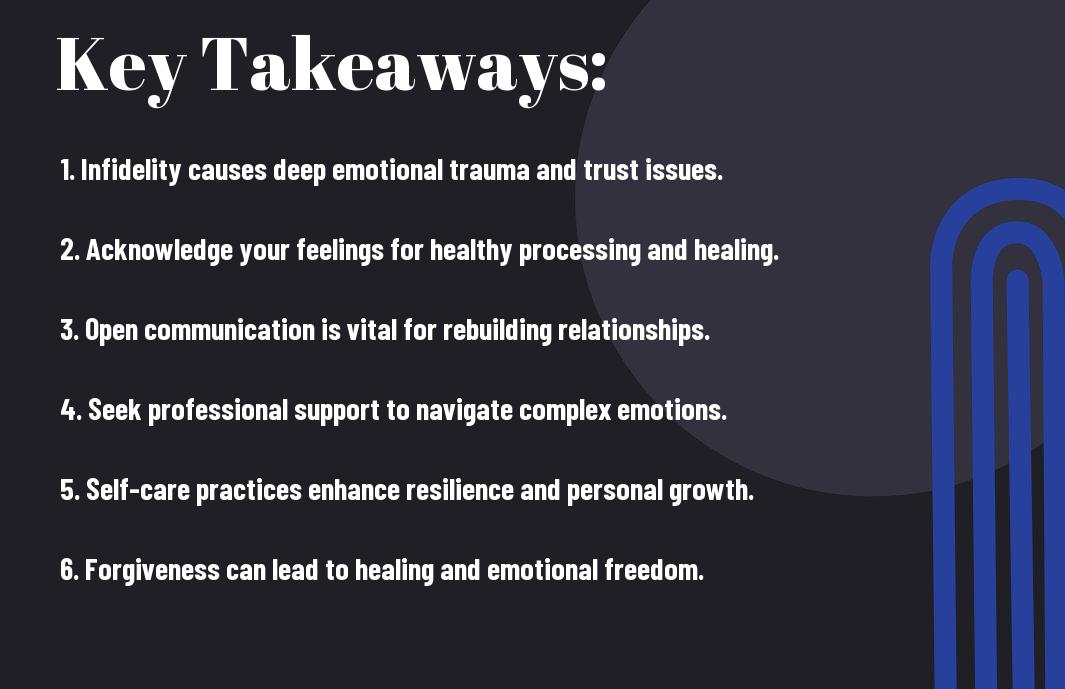Just as you begin to rebuild your life after experiencing infidelity, it’s important to acknowledge the emotional turmoil that comes with such a betrayal. The impact of infidelity can leave you feeling angry, confused, and devastated, but understanding these feelings is the first step toward healing. In this post, you will discover valuable insights into processing your emotions and practical strategies that can help you not only recover but also thrive in your relationships moving forward.
Key Takeaways:
- Infidelity can lead to a range of emotional responses, including anger, betrayal, and sadness, impacting both partners involved.
- Understanding the underlying reasons for infidelity is imperative for healing and can help in fostering open communication.
- Therapy or counseling can provide a supportive environment to process feelings and develop coping strategies.
- Forgiveness plays a vital role in moving forward, but it is a personal journey that takes time and effort.
- Rebuilding trust is necessary for relationships to heal, requiring consistent actions and transparency from both partners.
- Self-care and personal healing are important; engaging in activities that promote well-being can assist in the recovery process.
- Many individuals find that, with time and effort, they can emerge stronger and more self-aware after experiencing infidelity.

Understanding Infidelity
Before you can begin to heal, it’s important to understand the complexities surrounding infidelity. This betrayal can manifest in various forms and can deeply impact your emotional well-being. Acknowledging the dynamics at play will help you navigate your feelings and reconnect with your sense of self as you work through this painful experience.
Defining Infidelity
Across relationships, infidelity signifies a breach of trust, often taking the shape of emotional, physical, or sexual betrayal. It’s crucial to recognize that each relationship has its own boundaries, and what constitutes infidelity for one couple may not apply to another. Understanding this distinction can aid in your healing journey.
The Impact of Betrayal
Above all, the emotional fallout from betrayal can be overwhelming, leaving you feeling hurt, angry, and confused. Your trust in others and yourself is often shattered, leading to feelings of inadequacy or self-doubt. Coping with the aftermath may feel like an insurmountable challenge.
Considering the profound effects of betrayal, it’s important to acknowledge the range of emotions that surface. The pain can lead to anxiety, depression, and isolation, but there is potential for growth through this adversity. You may find a stronger sense of self and an enhanced ability to foster healthy relationships in the future. By addressing your feelings openly, you pave the way for personal transformation and emotional resilience.

Emotional Reactions to Infidelity
Some emotional reactions following infidelity can be overwhelming and deeply impactful. You may experience feelings of betrayal, confusion, and loss, which are all natural responses to such a traumatic event. Understanding these emotions is the first step toward healing. For more insights on recovery, check out Healing from Infidelity: How to Rekindle Intimacy and ….
Shock and Denial
Between the initial discovery of infidelity and the subsequent fallout, you may find yourself in a state of shock and denial. This mental numbness can serve as a defense mechanism, as your mind struggles to process the betrayal. Allowing yourself some time to come to terms with reality can help in navigating this disorienting phase.
Anger and Resentment
Below the surface of shock, feelings of anger and resentment often emerge. They can be directed not only at your partner but also at yourself for not seeing the signs. This anger, while difficult to manage, is a natural response that can be harnessed as part of your healing journey.
Due to the intensity of the betrayal, your feelings of anger and resentment can be particularly damaging if left unchecked. This rage may manifest in unhealthy *outbursts* or *withdrawal*, impacting your overall well-being. It is necessary to acknowledge these emotions and process them constructively to move toward healing. *Channeling this anger into productive actions* can pave the way for healthier coping mechanisms, enabling you to reclaim your sense of self and ultimately thrive beyond the pain of infidelity.
The Healing Process
Keep in mind that healing after infidelity is a journey that requires time and patience. Emotions can be intense, and acknowledging your feelings is an important first step toward recovery. Embrace the pain, anger, and sadness, as these emotions are valid and part of the process. Allow yourself to feel deeply, as this will help you move forward.
Acknowledging Feelings
Beside acknowledging your emotions, it is important to understand that this process also involves recognizing the complexity of your feelings. You may experience a rollercoaster of emotions, from betrayal to confusion, and it’s okay to feel this way. Accepting these emotions is vital in addressing the impact of infidelity on your life.
Seeking Support
With every step of the healing process, do not hesitate to seek support from friends, family, or professional therapists. Engaging with others can provide you with valuable insights and create a comforting space for sharing your thoughts and feelings. Isolation can often intensify emotional pain, so surrounding yourself with a support network is key.
A strong support system can significantly aid your healing journey. Don’t underestimate the power of talking to friends or loved ones who can provide empathy and understanding. You may also consider joining support groups where others have experienced similar situations; sharing your story can be therapeutic. If you find your feelings overwhelming, seeking help from a professional therapist can offer personalized tools for coping and rebuilding. Surrounding yourself with supportive individuals can help you feel less alone and promote a healthier recovery.

Rebuilding Trust
After experiencing infidelity, rebuilding trust is important for healing. This process requires time, patience, and a commitment to transparency from both partners. You must actively engage in rebuilding the emotional safety in your relationship, allowing for vulnerability and clarity. Take small but consistent steps towards establishing a new foundation, facilitating a renewed connection, and fostering emotional intimacy.
Communicating Openly
Around every corner of healing lies the need for open communication. Sharing your feelings, fears, and expectations can lay the groundwork for trust to flourish again. It’s important to create a safe space where both partners feel heard and valued, promoting understanding rather than defensiveness.
Setting Boundaries
Above all, establishing clear boundaries in your relationship can help both partners feel secure moving forward. You need to define what is acceptable and what is not, ensuring a mutual agreement on how to navigate interactions with others, including maintaining emotional safety in your relationship.
It is important to be specific when setting boundaries. Discuss privacy, personal space, and social interactions, laying out clear expectations for both partners. This process helps guard against potential threats and fosters a sense of security. Address your partner’s needs and concerns to create an environment of cooperation and understanding. By prioritizing these boundaries, your relationship can cultivate an atmosphere of respect and integrity, ultimately paving the way for lasting trust.
Moving Forward
Not all relationships can return to what they once were after infidelity, but that doesn’t mean you can’t rebuild and thrive. Embrace the opportunity to redefine your life and relationships on your own terms. This is a time for reflection, healing, and growth, which can lead to a more fulfilling future.
Personal Growth
The journey of healing from infidelity can be a powerful catalyst for personal growth. By confronting your pain and recognizing the lessons learned, you can enhance your understanding of yourself and your needs. This period can prompt you to develop greater emotional resilience, deepen your sense of self-worth, and foster healthier relationship patterns moving forward.
Establishing New Norms
With this newfound clarity, you can establish new norms that reflect your evolved values and boundaries. Redefining what you want in a relationship helps you communicate your needs more effectively and fosters healthier connections.
To create these new norms, begin by clearly identifying your values and what you truly want in future relationships. This may involve openly discussing expectations with your partner or even seeking professional guidance. Setting boundaries is vital; ensure that both you and your partner understand what behaviors are acceptable moving forward. As you embrace change, focus on cultivating a supportive environment where vulnerability can thrive—this will not only empower you but also let you lay a strong foundation for healthier interactions in the future.
Seeking Professional Help
Now is the time to consider professional help if you are grappling with the emotional fallout of infidelity. This journey can be overwhelming, and navigating it alone may not be the best approach. A trained therapist can provide the support you need, guiding you through complex emotions and helping you find a path towards healing and resilience.
Therapy Options
Therapy can take many forms depending on your needs. Individual therapy offers a safe space to explore your feelings, while couple’s therapy can facilitate communication between partners. Cognitive-behavioral therapy (CBT) is also effective, helping you to reframe negative thoughts, while other approaches may focus on emotional processing or attachment styles.
Support Groups
By joining a support group, you gain access to a community of individuals who share your experiences. These groups offer a platform to discuss feelings openly, which can be incredibly therapeutic. Connecting with others who understand your pain fosters empathy and resilience.
Further, participating in support groups can provide validation of your experiences while reducing feelings of isolation. You’ll hear stories that resonate with your own, allowing you to process your emotions in a safe environment. Facilitators often guide discussions, ensuring that you learn valuable coping strategies and develop a sense of belonging as you move toward healing together. Engaging with others can empower you to not only cope but also thrive beyond the pain of infidelity.
Summing up
Considering all points, navigating the emotional turmoil of infidelity can feel overwhelming, but it’s possible for you to heal and thrive. By acknowledging your feelings, seeking support, and focusing on self-care, you can rebuild your emotional resilience. It’s important to approach the healing process at your own pace and recognize that personal growth often arises from painful experiences. Trust that, with time and effort, you can emerge stronger and ready to embrace healthier relationships in the future.
FAQ
Q: What are some common emotional reactions to infidelity?
A: Individuals may experience a wide range of emotions after discovering infidelity, including shock, betrayal, sadness, and anger. These feelings can be overwhelming and may lead to confusion about the future of the relationship. Many also feel a loss of self-esteem and question their worth or the value of their relationship.
Q: How long does it typically take to heal from the emotional impact of infidelity?
A: Healing from the emotional fallout of infidelity varies greatly among individuals. Some may begin feeling more at peace within a few months, while others may take years. Factors influencing this timeline include personal coping mechanisms, the level of support received, and whether the relationship continues or ends. The key is to allow oneself the necessary time to process feelings and seek support when needed.
Q: What steps can one take to begin the healing process after infidelity?
A: To start healing, it can be beneficial to express feelings openly, whether to friends, family, or a therapist. Engaging in self-care activities, such as exercise, journaling, or meditation, can help process emotions. Establishing clear communication with a partner (if reconciliation is desired) or setting boundaries (if moving on is the goal) is also vital in navigating this painful time.
Q: Can a relationship survive infidelity, and what does that healing look like?
A: Yes, many relationships can survive infidelity, though it requires significant effort from both partners. Healing involves transparent communication, rebuilding trust, and understanding the underlying issues that led to the infidelity. Couples therapy often provides a supportive environment for addressing these matters, fostering growth, and helping both partners move forward together.
Q: What resources are available for those dealing with the aftermath of infidelity?
A: Numerous resources are available for individuals coping with infidelity. Books, online forums, and support groups can provide valuable insights and shared experiences. Furthermore, seeking professional therapy can be a lifesaver, offering a safe space for emotional exploration and practical strategies for healing. Websites and hotlines focused on relationship issues can also be beneficial.
